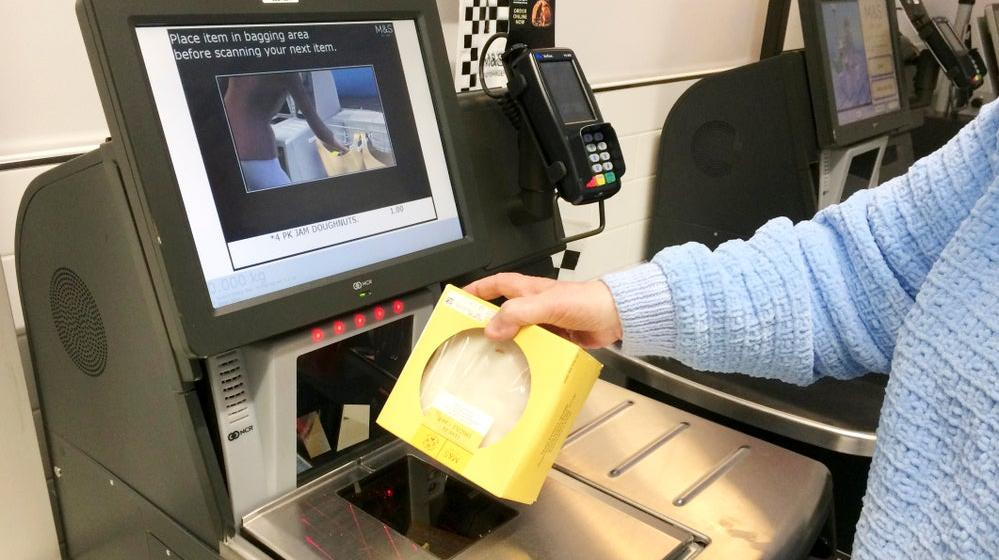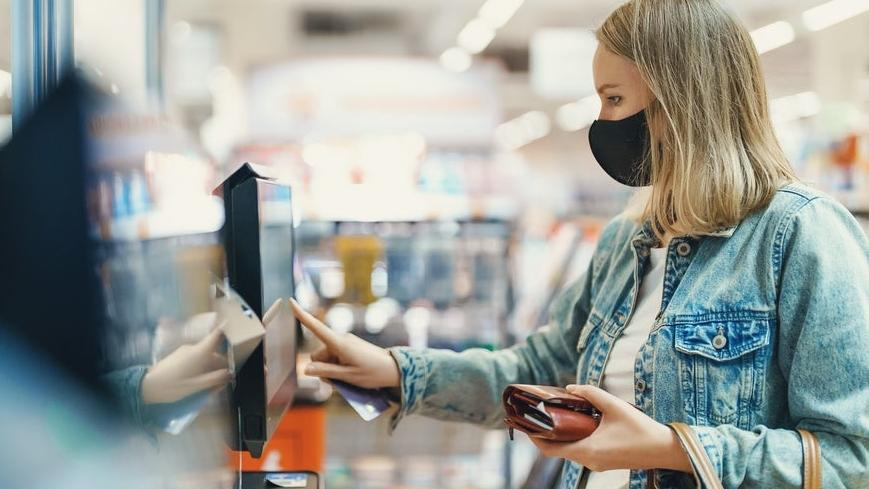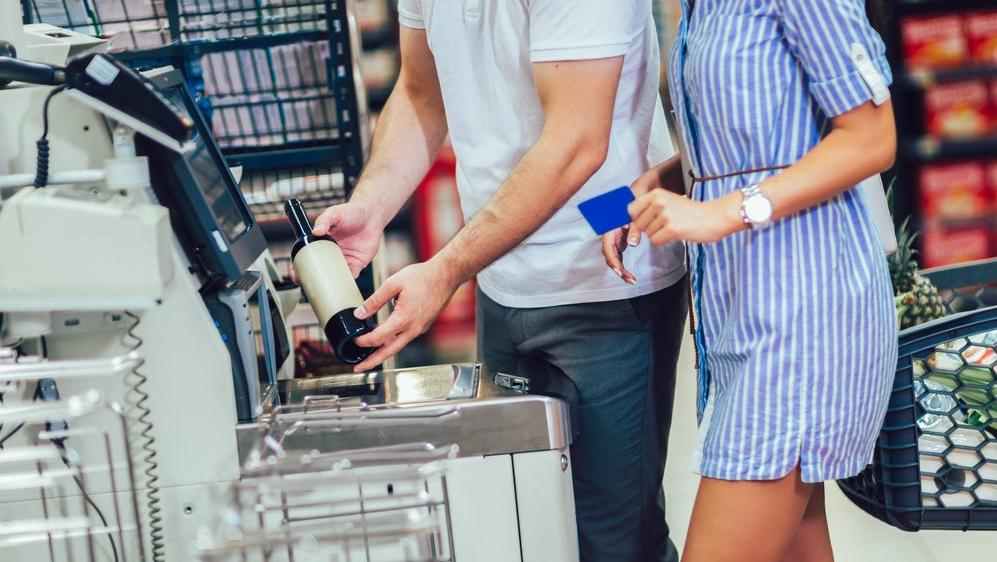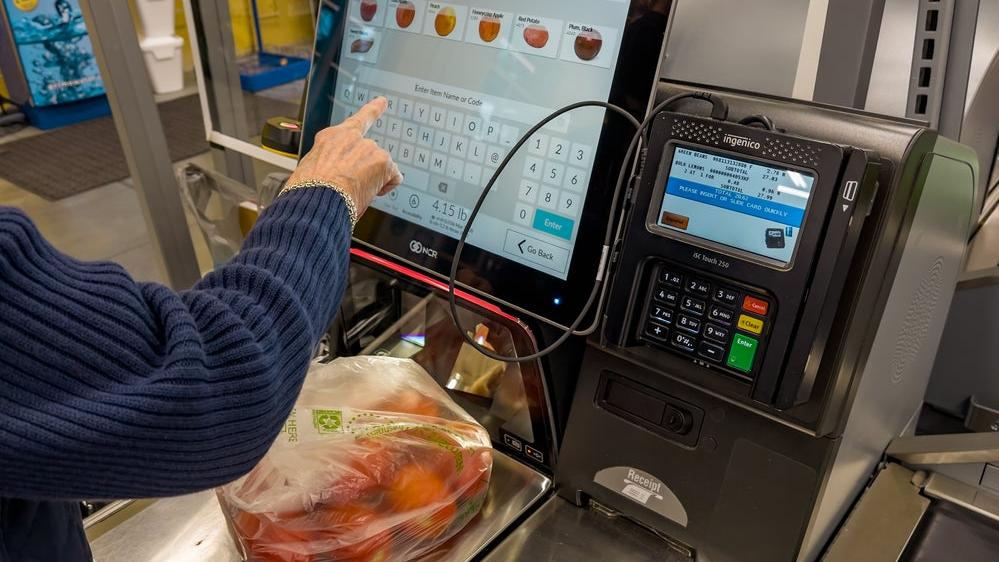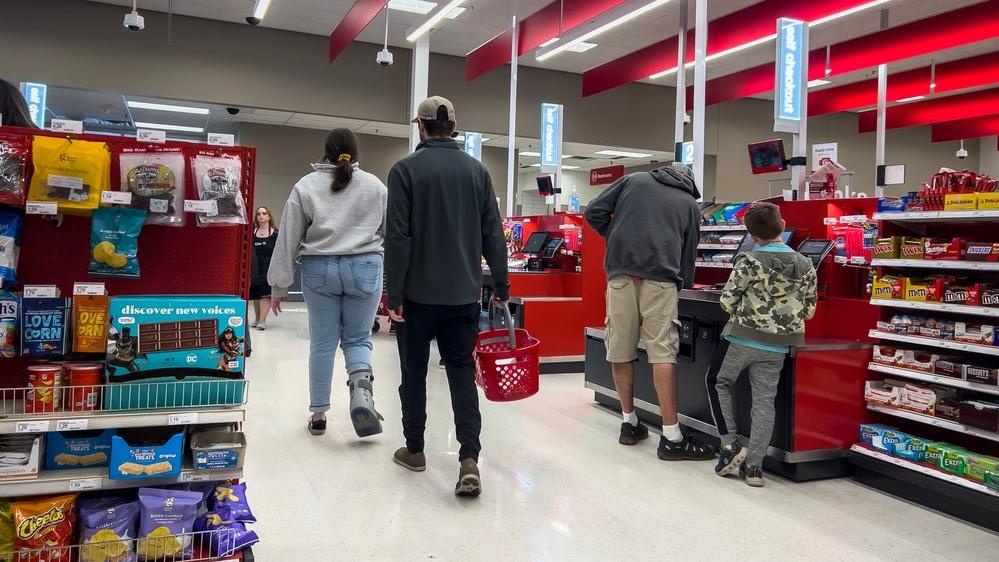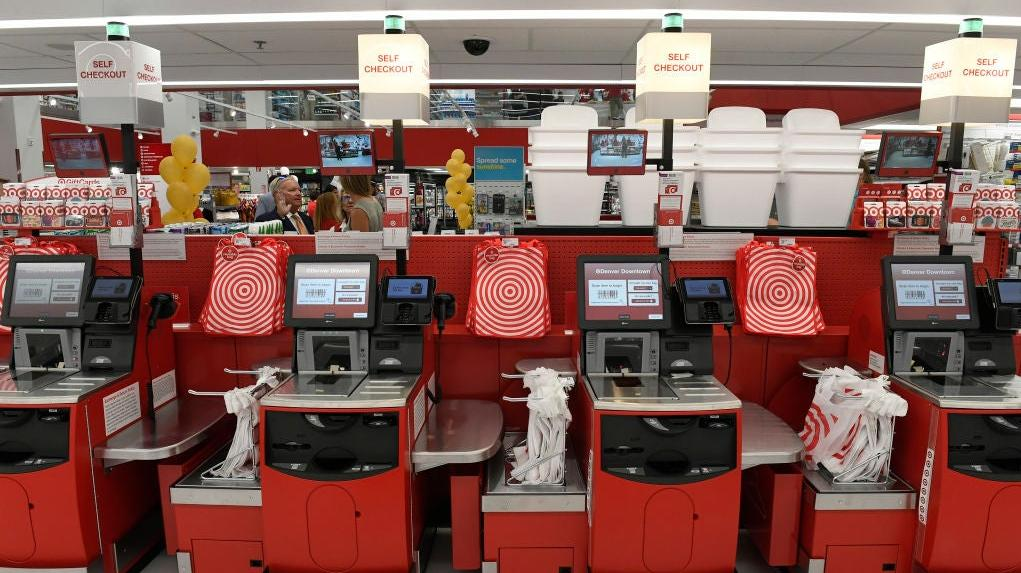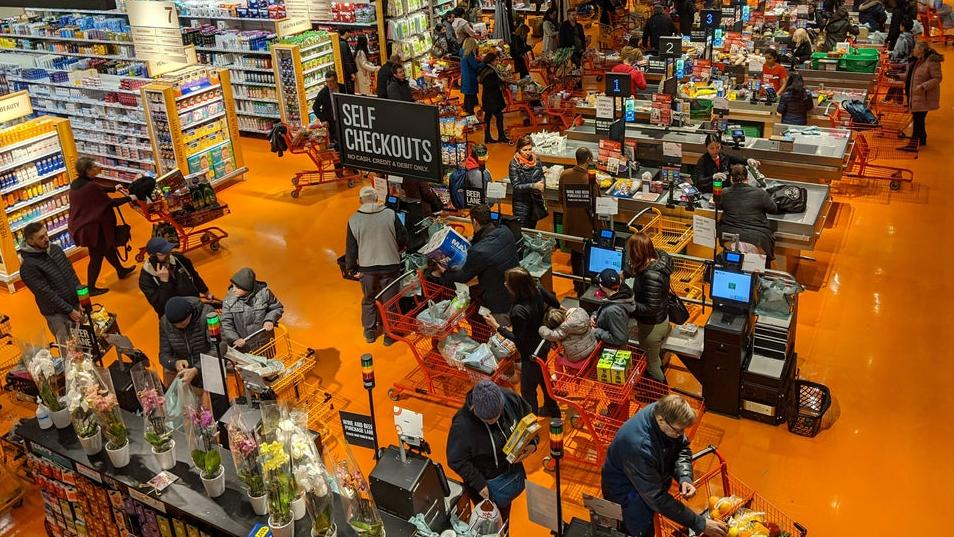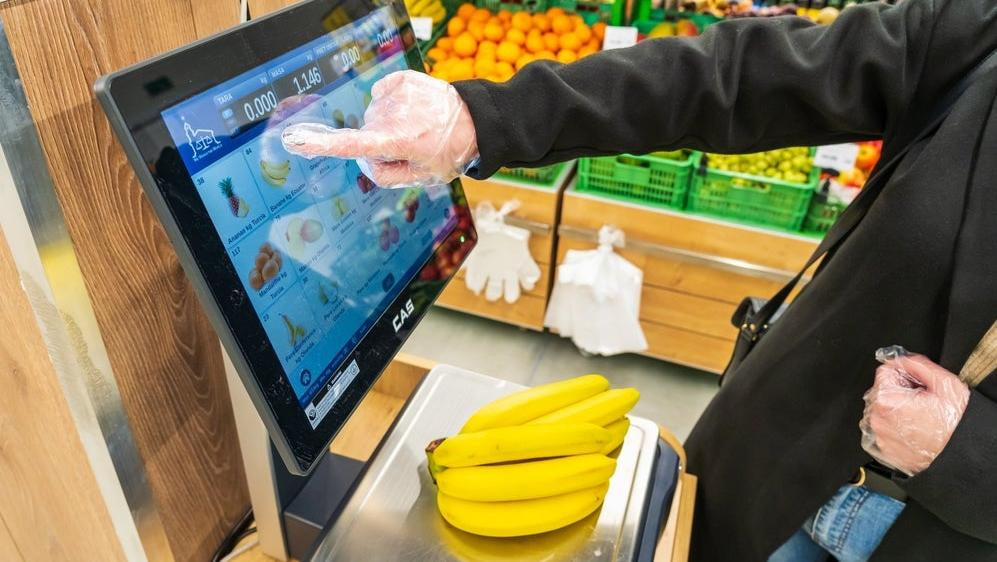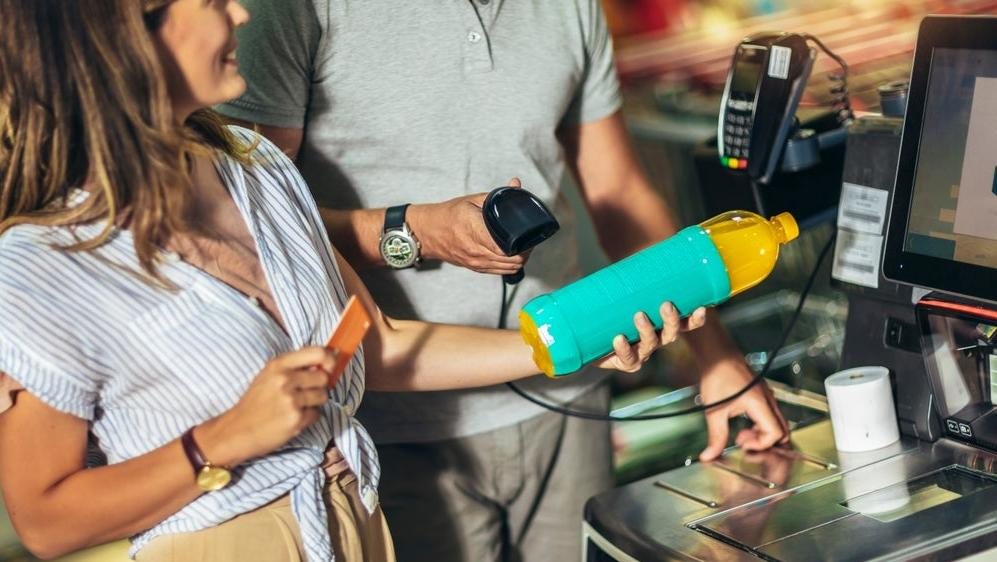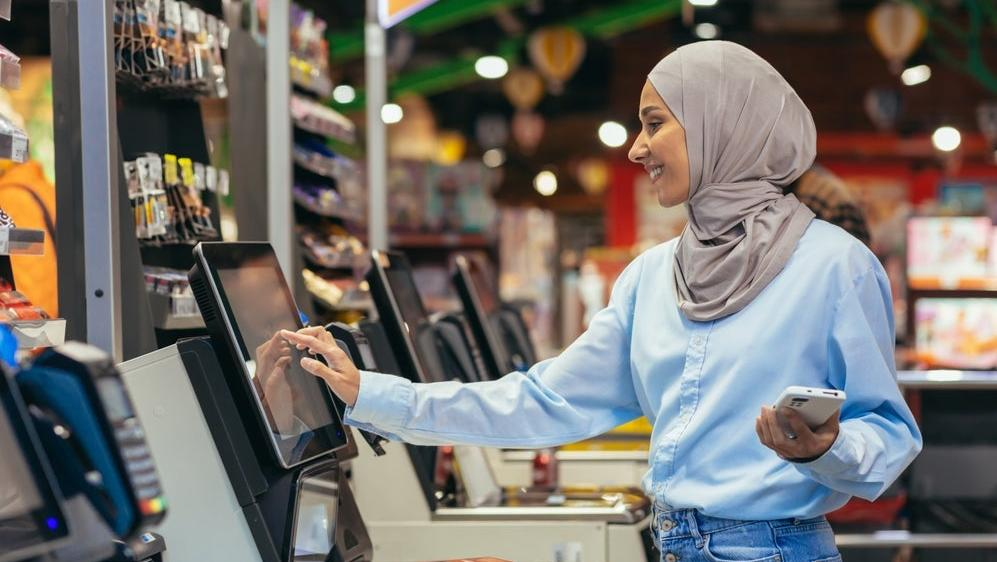The 8 Unbreakable Rules Of Self-Checkout Etiquette
Self-checkout can be the worst part about grocery shopping. Here's how to make it better.
Self-checkout has been around for a hot minute now—longer than you think. Its first grocery store appearance is cited as having debuted at an Atlanta Kroger in July 1986 and reportedly looked like an airport luggage scanner. Since then, the offering has become streamlined and widespread, so much so that some Walmart, Target, and Dollar General stores have (nightmarishly, and not just for the workforce) fully replaced associate checkout with the kiosks.
As the pandemic increased the perceived ick factor of human interaction, there was a dramatic acceleration of self-checkout adoption. Trade publication Grocery Dive reported in November 2022 that the number of self-checkout lanes in the U.S. had increased by 10% in five years and comprised a massive 40% share of grocery store checkout options, despite 49% consumer preference for manned lanes—typically high school educated Boomers and Silent Generation shoppers with household incomes under $100,000.
Regardless of what we the people may want, the corporate robots have arrived and they're here to stay. Unfortunately, they're not the smartest of their kind. But apparently, neither are we. As Redditor Crooooow posted a heaping 12 years ago, "There is no etiquette. Self-checkout is the only pure anarchy."
Today, despite their ubiquity, the self-checkout area is still a bit of a wild, wild West, with plenty of road rage cruising down those lanes. Newbies and scaredy-cats can gum up the works for more experienced shoppers, most of whom have seemingly adopted at least some unspoken rules for this lawless corner of the supermarket.
It's about time we turned those loose, common-sense guidelines into hard-and-fast commandments. With majority-reflective opinions we've sourced from across the country and internet, we're laying down the official-with-a-capital-O rules of etiquette. Here's how not to be the worst person in the self-checkout lane.
Know your skill level.
One of the most hotly debated topics across countless threads of Reddit is if a shopper should be in the self-checkout lane at all ... or if they should just GTFO of the way. Shoppers are split regarding the max amounts of items that should be allowed, with many an angry Redditor defending their full carts ("It's self-checkout, not speedy checkout," argues Rainbwned). But virtually everyone agrees that skill level is crucial. Universally, your right to be on self-checkout is proportionate to your general ability to do this job that just a generation ago was derisively considered a "high school job" on par with "flipping burgers." Isn't karma a bitch, y'all? [Cackles in working-class glee]
"If you have enough groceries that you need help bagging, don't use self-checkout," says Hanorah Grill of Vermont. "Unless there is no available staff at registers, if you are bad at self-checkout, keep it to 15 items or less. How do you know you're bad at it? If you've ever needed help twice in one session, you're bad at it."
Andrea McKeever on Long Island, New York agrees: "I hate when I'm behind people who take a million things up and then, when they get to the scanner, have no concept of how the technology works and get all, 'How do I do this?' when their cart is spilling over."
Of course, that's not to say novices aren't welcome—just that there's a time and a place. Unsure shoppers should build up to larger self-checkout purchases, because experience is important and a bountiful buy is the equivalent of trial by fire. "It's fine if it's not busy and there are plenty of registers, but if there's a wait, then no," McKeever emphasizes.
Save your booze for staffed registers.
The contents of your cart can also determine whether you'll be brushing off angry, judgmental stares. And nothing ignites shoppers' rage quite like booze in the self-checkout lane.
Sometimes it's unavoidable, since some places don't have enough staff to ring up alcohol purchases—"So it's not always the person's fault, but capitalism's," says Atlantan Alex Ortiz. However, he still believes that "anybody buying alcohol in self-checkout is fundamentally an asshole."
"You know you'll need an associate, so if you have to, tell the associate beforehand," Ortiz says. "But don't just stand there with your giant box of wine thinking you can just walk out without massively inconveniencing everyone else."
Grill agrees. "Watching someone stand there hopelessly waiting for an overworked staff member to notice their blinking red light, come over, and clear the purchase is pathetic," she says. "Just check out at a regular register and save yourself the embarrassment."
Know your produce. (Yes, really.)
I know I'm not the only one who's watched seasoned associates key in produce codes with blazing-fast accuracy. It's awe-inspiring. But there's a reason they're paid for that, while we mere mortals fumble to look up the item on the self-checkout screen.
"Buying a lot of vegetables at self-checkout when there's a wait is a solid dick move," says McKeever, adding that there are just too many steps and too much margin for error for unskilled shoppers who spend too much time trying to find it on the list and figure out how to weigh it.
If you're going to make the attempt, know your produce. "I've seen people sit there and try to figure out what they're buying," Ortiz says; I personally find it astounding that so many people don't really know what they're purchasing. As if shoppers just pick up some random produce and go, Behold, a vegetable! I shall make you mine!
Not knowing which fresh fruits or vegetables you're buying can turn checkout into a long and arduous process. Most self-checkout machines are now equipped with images for the produce-illiterate, but still, try to remember what you put in your cart.
Respect the line.
Most self-checkout stations are organized into clusters, with a single line funneling shoppers through one entry point that opens up to a bullpen of stations. But until you get through that bottleneck, it can feel a little crowded, and just because COVID is no longer a headliner doesn't mean we should go back to invading personal spaces.
Continue to respect some modicum of social distancing and avoid piling up, bumping into others, or driving your shopping cart or basket into people's ankles. If you brought your kids shopping, the same rules apply to them as well.
"If the store is busy, your little kids should not be helping you scan items," says Grill, a mother of toddlers herself. "I'm sure they love it and you think it's cute, but if there is a line behind you, cut that shit out." Save the self-checkout playtime for off-peak hours.
A lengthy AITA Reddit thread backs Grill up on this one, with many users agreeing that while self-checkout is a valuable skill to teach a child, peak shopping times with a long queue is not the appropriate moment for a lesson.
Finally, don't blast music or have loud speakerphone/video chat conversations in this congested area. Nobody needs to know that much about you, whether it's your family tea or your musical taste (or lack thereof).
Claim your register promptly.
The nice thing about the single-line system of waiting for the self-checkout lanes is that you aren't stuck if you get in line behind a slowpoke. When it's first come, first served on multiple kiosks, it's easier to move an entire line along faster and more smoothly. But it's up to each customer to make this system work best, and that means keeping a roving eye out for the next available opening when you're at the front of the line.
"I do get very angry when people don't go to open [kiosks] because they're hyper-focused on the ones closest to them instead of looking at all of them," Ortiz says. "Sometimes, if they're hanging on too long, overly determined to use one particular [kiosk], I'll go around them to the open one since they clearly didn't want it too much." He compares this tactic to "a gentle honk when someone is sitting at a green light." (Attempting to get their attention and direct them to another open kiosk is also an option.)
Paying attention may also afford you the chance to do a good deed. For instance, if you aren't crunched for time and someone behind you looks like they're in a rush, you can let them go ahead of you. North Carolinian Kelly Abramson endorses this: "I definitely let single-item shoppers cut, and I really appreciate it when others do it for me because chances are, if I'm in a whole-ass supermarket for one thing, I'm 99% of the time in a hurry!"
Need help? Be nice about it.
The biggest pain point of self-checkout is that it's a cost-cutting capitalist scheme, as Ortiz pointed out earlier, and it's designed to reduce jobs. However, machines are not infallible, and will never fully replace workers. So for the six-plus self-checkout registers, there's usually one very harried associate trying to keep pace with all the blinking lights and cries for help. That brings us to one of our most important rules: Don't be a dick to this very overwhelmed human.
"Don't make a scene, shouting that you have a problem," says Daryl Thomen of New York. "And don't cut in when they're helping someone else. Use the button on the screen then wait your turn—the associate will get to you."
Abramson agrees, and says that people should keep their impatience to themselves, especially within earshot of the employee. "Don't yell at the workers when it's not their fault, like when the machine is malfunctioning or [the shopper doesn't] understand the technology," she says. "I hate when people commit user errors and then complain loudly about the workers like it's their fault, because the workers just have to sit there and take it."
Leave no trace, make no waste.
This should go without saying, but customers should actively avoid making a mess at the self-checkout scanner. Leave behind some stray onion skin? Brush it off in the garbage can that's always nearby. Dripping packages of meat? Use the hand scanner if available instead of draping meat juice all over everything. Exploded yogurt? Ask an associate for a cleanup on Aisle You—they keep supplies at their station.
Along those lines, if you change your mind about buying an item, don't just leave it there and hope that an overworked employee will eventually notice and put it back. For refrigerated or frozen items, there's only a limited time that a product can be out before it ends up becoming part of the 119 billion pounds of food unnecessarily wasted in the United States each year. Ask the associate what should be done with the unwanted item. And if you were sipping on an outside beverage and finished it while shopping, throw it out in the proper receptacle. No one wants to weigh their apples next to a sticky abandoned Frappuccino cup.
Finally, with supermarkets across the country eliminating plastic bags in an attempt to cut down on waste, shoppers in states that still use them should bag mindfully. Not everything needs to be double- and triple-bagged. Grab just one at a time, and don't just throw out the whole fistful if you happen to pull too many. Put them back on the rack for the next customer.
OMG, just leave.
Whether you're bagging your purchases or reviewing your receipt, try not to linger in front of the checkout station too long.
Ortiz advises having your card at the ready once you're done scanning—or, if you use cash, have it close at hand to feed into the machine. "It should not take more than ten seconds," he says. "If you have to call the attendant to figure out how to pay, you probably aren't ready for self-checkout."
Once your transaction is complete, grab your stuff and go.
"Take your receipt, please," Thomen says. "They build up and it becomes a mess. There's usually a trash can on your way out or a recycling bin, so just take it with you."
Same goes for your shopping basket. There's usually a spot underneath the self-checkout kiosk for baskets or a drop-off stack by the associate's podium, so there's no need to leave it obnoxiously on the shelf where others need to put their own baskets.
The bottom line
With a little bit of consideration, there's no reason for self-checkout to be an anarchic hellscape. Order and decency are cornerstones of civilization, and with robots and AI not so quietly taking over the world, our small acts of courtesy can help us retain our humanity just a little bit longer.
